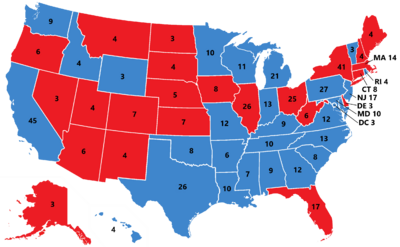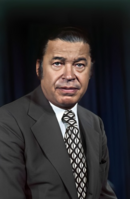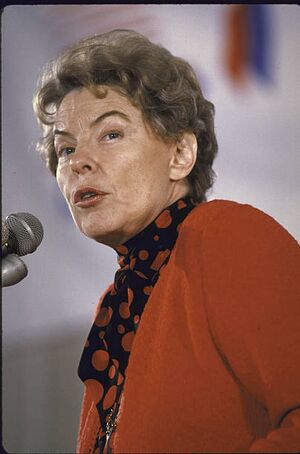1976 United States presidential election (BMC): Difference between revisions
mNo edit summary |
mNo edit summary |
||
| (6 intermediate revisions by 2 users not shown) | |||
| Line 37: | Line 37: | ||
| map_caption = Presidential election results map. <span style="color:blue;">Blue</span> denotes states won by Kirkpatrick/Jackson and <span style="color:red;">Red</span> denotes those won by Rockefeller/Brooke. Numbers indicate [[electoral votes]] cast by each state and the District of Columbia. | | map_caption = Presidential election results map. <span style="color:blue;">Blue</span> denotes states won by Kirkpatrick/Jackson and <span style="color:red;">Red</span> denotes those won by Rockefeller/Brooke. Numbers indicate [[electoral votes]] cast by each state and the District of Columbia. | ||
| title = President | | title = President | ||
| before_election = Robert Taft Jr. | | before_election = [[Robert Taft Jr.]] | ||
| before_party = Republican Party (United States) | | before_party = Republican Party (United States) | ||
| after_election = Jeane Kirkpatrick | | after_election = [[Jeane Kirkpatrick]] | ||
| after_party = Democratic Party (United States) | | after_party = Democratic Party (United States) | ||
| ongoing = no | | ongoing = no | ||
}} | }} | ||
The 1976 United States presidential election was the 48th quadrennial presidential election. It was held on Tuesday, November 2, 1976. Incumbent U.S. President Robert Taft Jr. was term-limited and did not seek re-election. Vice President Clifford P Case declined to run for the Republican nomination, which was won by Fmr. Secretary of State Nelson Rockefeller. The Democratic nomination went to Oklahoma Governor Jeane Kirkpatrick. Both candidates won their nominations at brokered contested conventions, where Rockefeller chose Massachusetts Senator Edward Brooke, and Kirkpatrick chose Washington Senator Henry Jackson. The ticket of Kirkpatrick/Jackson won the election, and hence Jeane Kirkpatrick would become the first female President of the United States and the first Oklahoman elected to the Presidency | The 1976 United States presidential election was the 48th quadrennial presidential election. It was held on Tuesday, November 2, 1976. Incumbent U.S. President Robert Taft Jr. was term-limited and did not seek re-election. Vice President Clifford P Case declined to run for the Republican nomination, which was won by Fmr. Secretary of State Nelson Rockefeller. The Democratic nomination went to Oklahoma Governor Jeane Kirkpatrick. Both candidates won their nominations at brokered contested conventions, where Rockefeller chose Massachusetts Senator Edward Brooke, and Kirkpatrick chose Washington Senator Henry Jackson. The ticket of Kirkpatrick/Jackson won the election, and hence Jeane Kirkpatrick would become the first female President of the United States and the first Oklahoman elected to the Presidency. Henry Jackson also became the first Vice President from Washington state. The election was held against the backdrop of the War in Peru, and Romania Crisis and focused heavily on foreign policy. | ||
The election occurred simultaneously as the regularly scheduled [[1976 United States elections (BMC)|elections to the U.S. Senate and for U.S. House, and other state and local races]]. | |||
In late 1975, the United States and it's allies in ADEN sought the liberation of Peru from the government of Abimael Guzmán. This followed the takeover of Peru by Shining Path militants. Further deteriorations in Peru occurred when U.S.-aligned President-in-exile Fernando Belaúnde was assassinated by Peruvian nationals in the United States. This significantly reduced support for President Taft and other Republicans, as the party was seen as dithering in Peru. This view was hardened by the Romanian Spring which significantly undercut Taft's appeal on the campaign trail. Despite this, Former Secretary of State Rockefeller made a competitive bid for the Presidency drawing heavily on his experience in forming ADEN. This fell short of the unified Democratic calls for a more hawkish foreign policy, who with Governor Kirkpatrick drew heavily on the hawkish policies of former President York. | In late 1975, the United States and it's allies in ADEN sought the liberation of Peru from the government of Abimael Guzmán. This followed the takeover of Peru by Shining Path militants. Further deteriorations in Peru occurred when U.S.-aligned President-in-exile Fernando Belaúnde was assassinated by Peruvian nationals in the United States. This significantly reduced support for President Taft and other Republicans, as the party was seen as dithering in Peru. This view was hardened by the Romanian Spring which significantly undercut Taft's appeal on the campaign trail. Despite this, Former Secretary of State Rockefeller made a competitive bid for the Presidency drawing heavily on his experience in forming ADEN. This fell short of the unified Democratic calls for a more hawkish foreign policy, who with Governor Kirkpatrick drew heavily on the hawkish policies of former President York. | ||
==Democratic | ==Nominations== | ||
===Primaries=== | ===Democratic Party=== | ||
===Candidates=== | {| class="wikitable" style="font-size:90%; text-align:center;" | ||
==Republican | |- | ||
===Primaries=== | | style="background:#f1f1f1;" colspan="8"|[[File:DemocraticLogo.svg|65px|center|link=Democratic Party (United States)|Democratic Party (United States)]]<big>'''1976 Democratic Party ticket'''</big> | ||
===Candidates=== | |- | ||
! style="width:3em; font-size:135%; background:#3333FF; width:200px;"| [[Jeane Kirkpatrick|{{color|white|Jeane Kirkpatrick}}]] | |||
! style="width:3em; font-size:135%; background:#3333FF; width:200px;"| [[Henry Jackson|{{color|white|Henry Jackson}}]] | |||
|- style="color:#000; font-size:100%; background:#c8ebff;" | |||
| style="width:3em; width:200px;"|'''''for President''''' | |||
| style="width:3em; width:200px;"|'''''for Vice President''''' | |||
|- | |||
| [[File:JeaneKirkpatrick1.png|200x200px]] | |||
| [[File:Scoopy 1.png|200x200px]] | |||
|- | |||
| 20th<br />Governor of Oklahoma<br /><small>(1971–1976)</small> | |||
| U.S. Senator<br>from Washington<br /><small>(1953–1976)</small> | |||
|- | |||
| colspan=2 |[[File:KirkpatrickJackson76.png|center|200x200px]] | |||
|- | |||
|} | |||
====Primaries==== | |||
[[File:JeaneKirkpatrickDNC1976.jpg|thumb|Jean Kirkpatrick delivers her acceptance speech at the DNC, 1976.]] | |||
The surprise winner of the 1976 Democratic presidential nomination was incumbent Oklahoma Governor, Jeane Kirkpatrick. Kirkpatrick bested eight other Democrats for the nomination which was settled on the seventh ballot at the DNC in New York City, New York, in August of 1976. Kirkpatrick had won a number of later primaries and consolidated support among dropout candidates which enabled her to outperform and therefore beat candidates popularly deemed better resourced, such as Senate Minority Leader, Russell E. Long of Louisiana or Governor Thurgood Marshall of Maryland. The convention supported by acclamation the nomination of U.S. Senator from Washington, Henry M. Jackson for Vice President, deemed to be an ideologically consistent choice for Vice President with Kirkpatrick. Despite the divisive primary and multi-balloted convention, multiple Democratic contenders unified behind Kirkpatrick and vocally supported her in the fall campaign. | |||
At the convention, significant tussles emerged between the top three candidates in delegate count from the primaries; Jeane Kirkpatrick, Thurgood Marshall & Robert Morgenthau. Morgenthau would yield his support to Kirkpatrick after the sixth ballot, allowing Kirkpatrick to claim victory on the seventh. | |||
====Candidates==== | |||
{| class="wikitable" style="font-size:90%; text-align:center" | |||
|- <sup>†</sup> | |||
| style="background:#f1f1f1;" colspan="16"|[[File:DemocraticLogo.svg|65px|center|link=Democratic Party (United States)|Democratic Party (United States)]]<big>'''1976 Democratic Party candidates'''</big> | |||
|- | |||
! scope="col" style="width:3em; font-size:120%;"|Shirley Chisolm | |||
! scope="col" style="width:3em; font-size:120%;"|Cyrus Vance | |||
! scope="col" style="width:3em; font-size:120%;"|Arthur Goldberg | |||
! scope="col" style="width:3em; font-size:120%;"|Robert Morgenthau | |||
! scope="col" style="width:3em; font-size:120%;"|Thurgood Marshall | |||
! scope="col" style="width:3em; font-size:120%;"|Russell B. Long | |||
! scope="col" style="width:3em; font-size:120%;"|Frank Church | |||
! scope="col" style="width:3em; font-size:120%;"|Henry M. Jackson | |||
|- | |||
|[[File:Shirley Chisholm.jpg|center|120x120px]] | |||
|[[File:CyrusVanceSoS.jpg|center|120x120px]] | |||
|[[File:Arthur Goldberg (1971).jpg|center|120x120px]] | |||
|[[File:Morgy.png|center|120x120px]] | |||
|[[File:Thurgoodmarshall1967 (cropped).jpg|120x120px]] | |||
|[[File:Russell B. Long – 1985.jpg|center|120x120px]] | |||
|[[File:FrankChurch.jpg|center|120x120px]] | |||
|[[File:HenryMJackson.jpg|center|120x120px]] | |||
|- style="text-align:center" | |||
|U.S. Representative<br>for New York's 12th congressional district<br /><small>(1969–1983)</small> | |||
|U.S. Senator from West Virginia<br /><small>(1961–)</small> | |||
|U.S. Senator from Illinois<br /><small>(1963–)</small> | |||
|Governor of New York<br /><small>(1963–1975)</small> | |||
|Governor of Maryland<br /><small>(1971–1979)</small> | |||
|U.S. Senate Minority Leader <br /><small>(1975–)</small><br/>U.S. Senator from Louisiana <br/><small>(1948–)</small> | |||
|U.S. Senator from Idaho<br /><small>(1957–)</small> | |||
|U.S. Senator from Washington<br /><small>(1953-1976)</small> | |||
|} | |||
===Republican Party=== | |||
{| class="wikitable" style="font-size:90%; text-align:center;" | |||
|- | |||
| style="background:#f1f1f1;" colspan="8"|[[File:Republicanlogo.svg|65px|center|link=Republican Party (United States)|Republican Party (United States)]]<big>'''1976 Republican Party ticket'''</big> | |||
|- | |||
! style="width:3em; font-size:135%; background:#E81B23; width:200px;"| [[Nelson Rockefeller|{{color|white|Nelson Rockefeller}}]] | |||
! style="width:3em; font-size:135%; background:#E81B23; width:200px;"| [[Edward Brooke|{{color|white|Edward Brooke}}]] | |||
|- style="color:#000; font-size:100%; background:#ffd0d7;" | |||
| style="width:3em; width:200px;"|'''''for President''''' | |||
| style="width:3em; width:200px;"|'''''for Vice President''''' | |||
|- | |||
| [[File:Nelson Rockefeller.jpg|200x200px]] | |||
| [[File:Brooke 76.png|200x200px]] | |||
|- | |||
| 54th<br />U.S. Secretary of State<br /><small>(1961–1968)</small> | |||
| U.S. Senator<br>from Massachusetts<br /><small>(1961–)</small> | |||
|- | |||
| colspan=2 |[[File:RockefellerBrooke76.png|center|200x200px]] | |||
|- | |||
|} | |||
====Primaries==== | |||
====Candidates==== | |||
==General election== | ==General election== | ||
===Campaign=== | ===Campaign=== | ||
===Results=== | ===Results=== | ||
===Close States=== | ===Close States=== | ||
Latest revision as of 08:57, 19 April 2022
| |||||||||||||||||||||||||||||
538 members of the Electoral College 270 electoral votes needed to win | |||||||||||||||||||||||||||||
|---|---|---|---|---|---|---|---|---|---|---|---|---|---|---|---|---|---|---|---|---|---|---|---|---|---|---|---|---|---|
| |||||||||||||||||||||||||||||
 Presidential election results map. Blue denotes states won by Kirkpatrick/Jackson and Red denotes those won by Rockefeller/Brooke. Numbers indicate electoral votes cast by each state and the District of Columbia. | |||||||||||||||||||||||||||||
| |||||||||||||||||||||||||||||
The 1976 United States presidential election was the 48th quadrennial presidential election. It was held on Tuesday, November 2, 1976. Incumbent U.S. President Robert Taft Jr. was term-limited and did not seek re-election. Vice President Clifford P Case declined to run for the Republican nomination, which was won by Fmr. Secretary of State Nelson Rockefeller. The Democratic nomination went to Oklahoma Governor Jeane Kirkpatrick. Both candidates won their nominations at brokered contested conventions, where Rockefeller chose Massachusetts Senator Edward Brooke, and Kirkpatrick chose Washington Senator Henry Jackson. The ticket of Kirkpatrick/Jackson won the election, and hence Jeane Kirkpatrick would become the first female President of the United States and the first Oklahoman elected to the Presidency. Henry Jackson also became the first Vice President from Washington state. The election was held against the backdrop of the War in Peru, and Romania Crisis and focused heavily on foreign policy.
The election occurred simultaneously as the regularly scheduled elections to the U.S. Senate and for U.S. House, and other state and local races.
In late 1975, the United States and it's allies in ADEN sought the liberation of Peru from the government of Abimael Guzmán. This followed the takeover of Peru by Shining Path militants. Further deteriorations in Peru occurred when U.S.-aligned President-in-exile Fernando Belaúnde was assassinated by Peruvian nationals in the United States. This significantly reduced support for President Taft and other Republicans, as the party was seen as dithering in Peru. This view was hardened by the Romanian Spring which significantly undercut Taft's appeal on the campaign trail. Despite this, Former Secretary of State Rockefeller made a competitive bid for the Presidency drawing heavily on his experience in forming ADEN. This fell short of the unified Democratic calls for a more hawkish foreign policy, who with Governor Kirkpatrick drew heavily on the hawkish policies of former President York.
Nominations
Democratic Party
| 1976 Democratic Party ticket | |||||||
| Jeane Kirkpatrick | Henry Jackson | ||||||
|---|---|---|---|---|---|---|---|
| for President | for Vice President | ||||||

|

| ||||||
| 20th Governor of Oklahoma (1971–1976) |
U.S. Senator from Washington (1953–1976) | ||||||
Primaries
The surprise winner of the 1976 Democratic presidential nomination was incumbent Oklahoma Governor, Jeane Kirkpatrick. Kirkpatrick bested eight other Democrats for the nomination which was settled on the seventh ballot at the DNC in New York City, New York, in August of 1976. Kirkpatrick had won a number of later primaries and consolidated support among dropout candidates which enabled her to outperform and therefore beat candidates popularly deemed better resourced, such as Senate Minority Leader, Russell E. Long of Louisiana or Governor Thurgood Marshall of Maryland. The convention supported by acclamation the nomination of U.S. Senator from Washington, Henry M. Jackson for Vice President, deemed to be an ideologically consistent choice for Vice President with Kirkpatrick. Despite the divisive primary and multi-balloted convention, multiple Democratic contenders unified behind Kirkpatrick and vocally supported her in the fall campaign.
At the convention, significant tussles emerged between the top three candidates in delegate count from the primaries; Jeane Kirkpatrick, Thurgood Marshall & Robert Morgenthau. Morgenthau would yield his support to Kirkpatrick after the sixth ballot, allowing Kirkpatrick to claim victory on the seventh.
Candidates
Republican Party
| 1976 Republican Party ticket | |||||||
| Nelson Rockefeller | Edward Brooke | ||||||
|---|---|---|---|---|---|---|---|
| for President | for Vice President | ||||||

|

| ||||||
| 54th U.S. Secretary of State (1961–1968) |
U.S. Senator from Massachusetts (1961–) | ||||||










